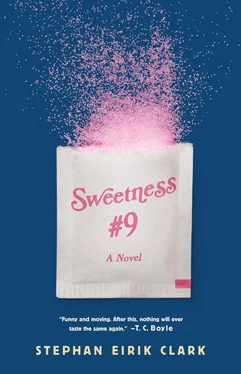“So is this normal?” I said. “His, you know, going there, and your…”
He was already nodding. “Business and government: they need to work together to provide safe, beneficial products that can be delivered to the market at an inexpensive but reasonable price. Don’t you agree? A reasonable price.”
I had come up here with a feeling of great urgency, but now I felt ready to sink through the bottom of my chair. There was something hypnotic about his voice. Something captivating about his dark, swept-back hair. I had thought him Irish at first, but now, looking into his mesmerizing deep-set eyes, I felt certain he was German.
He spun round in his chair and opened the lowest drawer of a green filing cabinet, then turned back to me and laid a manila folder on his desk. After opening it and reading for a moment, he said without looking up, “You’re Leveraux, right? Down in Animal Testing?”
“Yes, a flavorist-in-training,” I answered.
“Right, right”—he turned over a piece of paper, his eyes racing down the next page as he skimmed its contents—“don’t tell me: you’re the aerodynamics of Stilton.”
I wrinkled my nose, pushing the frames of my glasses up into my brow.
He looked at me. “Rutgers, right?”
“Oh!” Now I understood. “Yes, but it was the biophysics of brie.”
“That’s it.” He tapped his finger into the document opened before him, then threw it out toward me like the barrel of a gun. “But you lived in England, where they make Stilton.”
“That’s right, yes.” My voice had slowed; I leaned forward in my seat, trying to see what he was reading. I didn’t remember saying anything about England on my CV.
The man closed the folder then and threw a thumb back over one shoulder. “Baseball fan?”
In a photo on the wall, he stood alongside Bing Hardwell in foul territory of Philadelphia’s Veterans Stadium.
“Yes,” I said, “but the Yankees are my team. Passed down with the X chromosome.”
“Well, you may have more pennants than us, but one thing you do lack”—and here he turned his smile toward the picture—“is a man who can barbecue like that.”
“You don’t say?”
“You’re not a vegetarian, are you, Leveraux?”
“I’d rather die charging the last cow.”
“That’s what I like to hear. We’ll have to play hooky tomorrow and take in a game. I’ll introduce you.”
“To Bing?”
“Great guy.” He gave the file on his desk another glance. “Now, what brings you up to menswear, David? I thought you lab coats liked to stick to yourselves.”
I almost didn’t want to say anything anymore. Bing Hardwell! I’d never met a real live baseball player before, let alone a former MVP who was as good with the barbecue tongs as he was with a Louisville Slugger. I stammered out my response: “It’s just a few concerns, is all.”
He tapped the file. “You’re working on The Nine?”
“That’s right.”
“Problem?”
“No. No, I don’t know if I would call it that. Some concerns, though. A few concerns.”
His mouth hung open thoughtfully. I charged into it with a rambling talk about perceived personality changes, lowered test scores, and Louie’s difficulties in the maze. “The monkeys are no less disturbing. At first they went all but silent, and now they’ve grown considerably overweight. You could even say obese.”
I expected him to respond in some way, but he didn’t blink or move his head; he just looked at me, a faint smile held on his face. I cleared my throat (I am the type of man who clears his throat) and continued. “I thought to discuss this with Hickey — my lab-mate,” I said. “He has more experience with these things. But he’s not the greatest conversationalist, I’m afraid.”
“So you came up here?”
I nodded. “I couldn’t sleep last night. I got to thinking maybe The Nine triggers a primitive desire to eat.”
He turned in his chair to face the window. “A primitive desire to eat?”
“I checked my rats again this morning, and their BCS scores are in no way promising. At least half the population is leaning closer to obese than emaciated. The problem’s not quite as pronounced as it is with the monkeys, but it’s there all the same, and as The Nine is a no-calorie sugar substitute, the last thing we’d want is something that promotes weight gain.”
He nodded — this man whose name I realized I hadn’t been told. I looked in the direction he was looking, out to the surf silently pounding into the shore beneath a line of roiling grey clouds that looked like so many brains set up in a row, each heavy with the mysteries of the weather. We didn’t speak for a minute or more, and when at last he did continue, I realized I was holding my breath.
“Well,” he said, “I’m sure we could throw some money at it. The primitive desire to eat?” He swiveled his chair in my direction. “But what good would come of it? Who can say where the primitive desire to eat is located, or if we’re ever turning it on or off? Can you?”
I looked to the floor. I held my hands in my lap.
“The brain is like the Amazon, Leveraux. Ten steps in and we’re lost. Can’t see the sun, can’t hear the voice of your guide if he’s more than a machete whack away. There’s no north or south, no right or left — it’s all madness in there.” Again, he targeted me with a finger gun. “Cancer, though — cancer we can see. Cancer moves like a fire through the hills.” He pointed to the ceiling. “‘Look, there! Cancer!’ It’s easy. But everything else”—he shook his head—“it’s like a scuttling sound on the jungle floor, something that shakes a bush or runs up a tree just moments before you can identify it. It’s a shadow, Leveraux. A blur. And what are we supposed to do about that? ‘The primitive desire to eat.’”
He all but spat these last words out. I nodded. Then he rose from his chair and started round toward me. “What do you say we go get some lunch? I hear they have enchiladas today.”
I stood, but remained rooted to the floor. “I just can’t get past this one last thing. The monkeys were watching television. A Jerry Lewis movie. It seemed to calm them. But when I turned off the TV…” I frowned. “The most awful screams.”
He placed his hands on my shoulders and turned me toward him until we were looking at each other eye to eye. “Let’s not get ahead of ourselves, okay? Because what do we have here? A few fat monkeys, some apathetic rats? This is fine. Expected even. But you have to remember the scientific process, because until we have repeatable results—”
“Yes, of course.”
“—we can’t go off screaming into the wind.”
“Oh, I do hope I didn’t give that impression.”
“Because I’ll tell you something.” He led me out toward the elevators, his voice dropping to a whisper. “There are investors in this world so savvy they can pick up on the faintest psychic tremors emanating out from the centers of industry.” The elevator opened with a ding. He sent me in with a slap on the back. “Now, you remember to bring your glove tomorrow.” He pointed as the doors closed between us. “And I’ll call Bing and have him slow-cook us a brisket!”
BETTY VISITED THE DOCTOR that day with her mother, and was home by the time I arrived in the early evening. I found her on the sofa, lit up by the glow of the TV and wearing one of the baby-doll outfits I hadn’t seen since the start of summer. I thought this a positive sign until I sat down beside her and saw she was drinking something clear, on the rocks, with an olive in it.
I reached for her thigh. “How did it go at the doctor?”
She kept her eyes on the evening news and took a sip of her drink, the alcoholic intake telling me all I needed to know: it had been a phantom pickle, no baby all along, or perhaps just not one anymore.
Читать дальше












